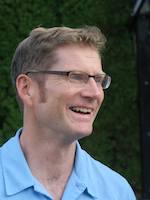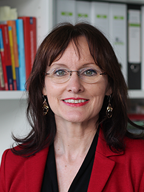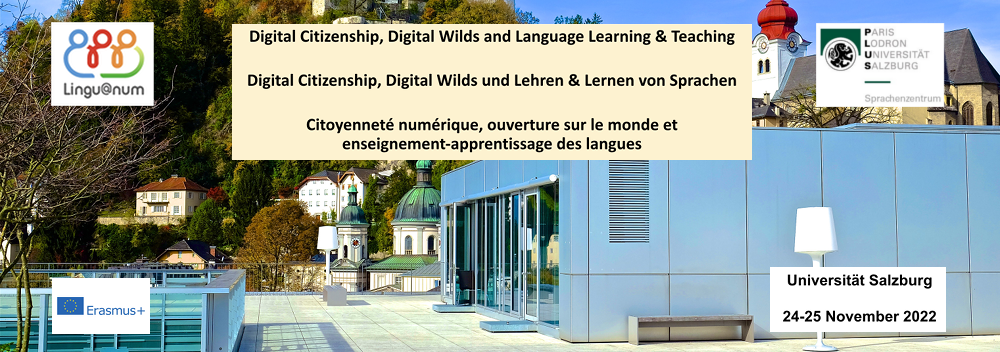Plénières / Plenary sessions / Plenarvorträge
Steven Thorne: Rewilding language education: Interfacing classrooms with the world
 |
There has been considerable research and innovation relating to pedagogies that interface world languages (L2) education with opportunities for interaction and learning that occur in settings that are primarily or fully outside of classroom contexts. This talk begins with a review of pedagogical approaches and learning outcomes that emerge from projects that incorporate instructed language learning with school-exogenous social formations and environments such as (1) integration of language education with specialized professional and academic communities, (2) participation in fandom and fan fiction interest groups, (3) exploration of urban spatialities and linguistic landscapes, and (4) supported participation in naturalistic everyday encounters (“learning in the "wild”). Each illustrates numerous possibilities for synergistically uniting the analytic rigor of instructed L2 education with the immediacy and vibrancy of language use in non-institutional, informal, and vernacular contexts. In conclusion, an evidence-based argument is made for continued exploration of opportunities for learning beyond the classroom, as well as the pedagogical amplification of such experiences in instructed settings, in order to increase the ecological validity and developmental power of language education.
|
Steven L. Thorne (Ph.D., UC Berkeley) is Professor of Second Language Acquisition in the Department of World Languages and Literatures at Portland State University (USA), with a secondary appointment in the Department of Applied Linguistics at the University of Groningen (The Netherlands). His research draws upon contextual traditions of language analysis and usage-based approaches to language development. Areas of interests include formative interventions in world languages education, communication across digital media and mobile technologies, and Indigenous language revitalization. In 2014, he was selected to receive the Faculty Research Excellence Award for Assistant and Associate professors at Portland State University. His research has appeared in numerous journals, edited collections, and books, the latter including Sociocultural Theory and the Genesis of Second Language Development (with James Lantolf, Oxford, 2006), Internet-mediated Intercultural Foreign Language Education (with Julie Belz, Thomson/Heinle, 2006), Language, Education, and Technology, Volume 9 of the Encyclopedia of Language and Education (3 rd Edition) (with Stephen May, Springer, 2017), and Engaging the World: Social Pedagogies and Language Learning (with Sébastien Dubreil, Cengage, 2017).
Christiane Lütge: Revisiting cultural and global learning? The impact of digital citizenship on foreign language education
 |
Recently, concepts of cultural and global learning have been faced with the challenge of integrating larger digital transformations in society into their scope. This is particularly interesting from the vantage point of Digital Citizenship Education (DCE). As an educational initiative, DCE seeks to empower children – and hence, learners – to thrive in a world that is thoroughly changing in light of digital advancements. While these initiatives and concepts rightly entail aspects as wide as creativity, active participation, information literacy, or critical reflection, their link to cultural and global learning in foreign language education has remained less clear. Questions that spring to mind, for example, include in what ways cultural diversity can become a classroom focus through the aid of digital media, in how far inter- and transcultural learning can be renegotiated or how learners can engage with global topics – including digitalization itself – from a participatory perspective. This talk therefore tries to retrace research on DCE, identify how discourses on DCE and cultural as well as global learning can be merged, and present a multidimensional model for anchoring DCE within foreign language education and teaching practice.
|
Christiane Lütge is professor at the Ludwig-Maximilians-University of Munich (LMU) where she holds the Chair of Teaching English as a Foreign Language. She is also the director of the Munich Centre of Teacher Education. Her areas of expertise in research and teaching include digital literacy and literary learning, literature in the foreign language classroom, as well as Global Citizenship Education and transcultural learning in EFL. She is a co-editor of the volumes The praxis of diversity (Palgrave Macmillan 2020) and of Digital Teaching and Learning: Perspectives for English Language Education (Narr 2021). She has recently set up a third-party funded project on Digital Citizenship Education (DiCE.Lang) in collaboration with researchers from Ireland, Portugal, Italy and Latvia.
|




